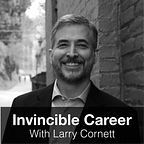
One of the happiest moments when I coach people is the day they accept a great job offer. They're so relieved to put the stress of the job search and endless interviews behind them. They're looking forward to starting something new.
However, that relief is soon replaced with a little bit of anxiety. They know they need to hit the ground running with their new employer. They want to make a good impression in that critical first 90 days.
One of the essential tasks in those first few weeks is meeting people and starting to build relationships. No one works alone. I don't care how great you are at what you do — if you work in a company with a team, your success depends on those relationships.
Some of your goals should be:
Starting things off on the right foot with colleagues.
Learning the organizational structure.
Discovering the underlying team dynamics and power structure (which is often quite different from the formal org structure).
Understanding how things get done at the company.
Identifying the pitfalls and gotchas that can sabotage a new employee's career at the company.
Finding out what has been working well and what's not working so well in the organization.
Getting to know people, who they are, what they do, what they want to accomplish, and what makes them tick.
Finding out how you can add value and improve things.
There really is no better way to tackle these goals than to meet with people one-on-one, whether in person or over Zoom. It’s more difficult — and it will take longer — to build good relationships in group meetings, via Slack chats, or during your everyday project work.
I’m a hardcore introvert, so I understand if some of you are reluctant to schedule many one-on-one meetings. But, it really is the best way to establish a connection and build rapport with people quickly.
Don't worry about being an imposition
Yes, I know that accomplishing those goals does sound like a lot of meetings. Some folks get a bit stressed about this and feel like they're imposing on people. They know that everyone is busy with their work, and they're concerned they’ll annoy colleagues with meeting requests.
But, don't worry about it!
People know that a new employee is in "learning mode" and trying to absorb as much institutional knowledge as possible. They expect to hear from you. In fact, if someone doesn't hear from you, they worry they are somehow not seen as possessing useful knowledge and information (e.g., "Why doesn't the new person/leader want to meet me?").
The secret to making these meetings valuable is to ensure they aren't a one-way street. You aren't just meeting people for your personal benefit. You should also ask questions and find out what your colleagues need most.
How can you help? How can you make their lives better?
New leaders, in particular, can authentically reach out and meet with people across the organization with a genuine interest in learning and getting input on how to improve things moving forward. There are always issues and problems. Always.
Sometimes people feel like the previous leader didn't listen to them (or care). Sometimes they feel like the current leadership doesn't understand them and their needs.
You can change all of that.
Of course, being a force for good change isn't just a leader's job. No matter your role with your new employer, you can become a champion for positive transformation in the organization.
Some questions to ask
Here are some questions that can help guide your conversations:
How do our teams currently work together?
What is the process here for doing XYZ?
What has been working well?
What are you most proud of accomplishing here?
What does success look like here?
What is not going so well?
What needs to change?
How do you think we could improve things?
How do you think we could improve the working relationship between our teams?
In my role, how can I help?
What would you most like to see from me?
How can I help you specifically?
Who else would you recommend that I meet?
You will feel like you’re drinking from the firehose. A ton of information is going to come your way. So, take notes and look for patterns.
People always seem to appreciate it and enjoy meetings like this when it comes from a place of authenticity and a genuine desire to work better together. If you're a leader, folks will be happy that you are taking the time to learn more about them and want to make their lives better at work.
However, there is a catch.
If you ask questions and listen but don't do anything about the issues, they will lose faith in you. You will soon be placed in the same category as other leaders who don't care.
That doesn't mean that you jump and literally do everything someone wants. But, you do need to demonstrate that you heard people, took all of the information in, processed it, and have a response to the problems, issues, and requests. Circle back and let folks know what your plans are.
A few caveats and mistakes to avoid
When you start a new job, you may be eager to please and want to demonstrate your expertise. When you hear people complaining about problems and making requests, you may be tempted to ride in like a knight in shining armor to slay beasts and save everyone. I encourage you to slow down and pace yourself.
Don't make immediate promises
Wait until you have all of the information you need and know how you want to address things. Sometimes you’ll hear about an issue and think, “Well, that’s easy to fix! I know exactly what to do.” But, later, you find out why that issue isn’t so easy to fix. If you jumped to conclusions and made a promise, now you have to go back and retract it. That’s not fun for anyone involved.
Don't overcommit
If you’re ambitious and want to make a great impression, it’s tempting to say “Yes!” to everything. You want to be helpful and show what you are capable of in those first few weeks. However, it’s too easy to take on too much before you know what you’re getting into, and now you’re setting yourself up for failure. Resist the urge to commit to everything you’re tempted to accomplish.
Never reward threats
Sadly, some people will see you as an opportunity to get what they want and threaten you (e.g., "I was promised a promotion by the previous manager, but never received it. If I don't get promoted this cycle, I'm going to quit."). Don't reward and reinforce this bad behavior.
Don't be forced into hasty decisions
One time when I joined a new employer, I was given a list of employees that were supposedly "poor performers" and told that I would need to manage them out. I said that I needed to get to know people before making such a decision. I found out they weren't poor performers at all and ended up being incredibly successful later when they worked on projects that better leveraged their talents.
Don't jump to conclusions
You need to talk with everyone, capture all of the information you can, and process things before you can really understand what's going on. It’s human nature for people only to see things from their perspective. It’s unfortunate, but some folks will point fingers and blame others for their problems. Get to the bottom of things before you decide what the truth is.
Take time to learn the company culture
Understand how people behave and communicate in the company before you leap into action. Resist the urge to talk about your past employer’s environment and processes (e.g., “The way things were done in my old company was way better”). Every company culture is different, so observe and learn as much as possible.
Be cautious with over-sharing
If you’re a friendly, extroverted person, you may tend to rush into friendships at work. But, I encourage you to take it a bit slow when establishing trusting relationships in the new office. You need to know who people really are, whom you can trust, and their reputation within the company.
Observe, process, and learn
Resist having “the answers” or talking about how you did things before. Don’t tell people that you know better ways to do something. At least not in the first few weeks. There will come a time when your fresh insights will be beneficial. But, most of your new colleagues aren’t ready to hear it yet.
Earn your stripes
You have to prove yourself before you can start pushing back hard on people, having strong opinions about how things are done (i.e., you don’t know enough yet), or sharing criticism. I remember a new hire mocking one of our coworkers in the first week on the job. Yeah, that didn’t go over well. Learn everything and earn trust first.
Good luck!
Starting a new job is exciting, but it can be a bit overwhelming. Don't be afraid to tap into the institutional knowledge of the colleagues around you.
Most people want to see you succeed and want to help. Show them that you want to help them succeed as well.
By the way, there is a great way you can support my work without spending any money on a premium subscription:
📣 Recommending my newsletter on social media! 📣
It only takes a few seconds, and it helps grow my business so I can continue making time to write it.
I’ll even provide some copy and paste text to make it easy to share on Twitter, Reddit, LinkedIn, Facebook, etc. Thanks in advance!
I've really been enjoying the Invincible Career newsletter by Larry Cornett (@cornett). If you want to get ahead at work and be happier in your job, but you aren’t subscribed yet, you’re missing out.
https://newsletter.invinciblecareer.com
Larry Cornett is a leadership coach and business advisor who hosts a private mastermind community for ambitious professionals with weekly challenges, office hours, and confidential support. If you’re interested in starting your own business or side hustle someday (or accelerating an existing one), check out his “Employee to Solopreneur” course (launching later this year).
Larry lives in Northern California near Lake Tahoe with his wife and children, and a gigantic Great Dane. He does his best to share advice to help others take complete control of their work and life. He’s also on Twitter @cornett.











